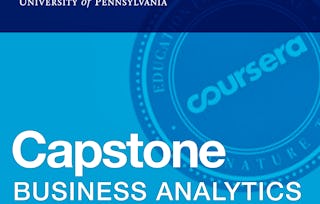People analytics is a data-driven approach to managing people at work. For the first time in history, business leaders can make decisions about their people based on deep analysis of data rather than the traditional methods of personal relationships, decision making based on experience, and risk avoidance. In this brand new course, three of Wharton’s top professors, all pioneers in the field of people analytics, will explore the state-of-the-art techniques used to recruit and retain great people, and demonstrate how these techniques are used at cutting-edge companies. They’ll explain how data and sophisticated analysis is brought to bear on people-related issues, such as recruiting, performance evaluation, leadership, hiring and promotion, job design, compensation, and collaboration. This course is an introduction to the theory of people analytics, and is not intended to prepare learners to perform complex talent management data analysis. By the end of this course, you’ll understand how and when hard data is used to make soft-skill decisions about hiring and talent development, so that you can position yourself as a strategic partner in your company’s talent management decisions. This course is intended to introduced you to Organizations flourish when the people who work in them flourish. Analytics can help make both happen. This course in People Analytics is designed to help you flourish in your career, too.

People Analytics

People Analytics
This course is part of Business Analytics Specialization



Instructors: Cade Massey
153,477 already enrolled
Included with
6,163 reviews
Skills you'll gain
- Employee Retention
- Performance Management
- Organizational Effectiveness
- Human Resources
- Data-Driven Decision-Making
- Data Analysis
- Employee Performance Management
- Collaboration
- People Analytics
- Human Resource Strategy
- Talent Management
- Analytics
- Network Analysis
- Workforce Management
- Performance Measurement
- Performance Analysis
- Predictive Analytics
- Human Capital
- Skills section collapsed. Showing 8 of 18 skills.
Details to know

Add to your LinkedIn profile
8 assignments
See how employees at top companies are mastering in-demand skills

Build your subject-matter expertise
- Learn new concepts from industry experts
- Gain a foundational understanding of a subject or tool
- Develop job-relevant skills with hands-on projects
- Earn a shareable career certificate

There are 4 modules in this course
In this module, you'll meet Professors Massey, Bidwell, and Haas, cover the structore and scope of the course, and dive into the first topic: Performance Evaluation. Performance evaluation plays an influential role in our work lives, whether it is used to reward or punish and/or to gather feedback. Yet its fundamental challenge is that the measures we used to evaluate performance are imperfect: we can't infer how hard or smart an employee is working based solely on outcomes. In this module, you’ll learn the four key issues in measuring performance: regression to the mean, sample size, signal independence, and process vs. outcome, and see them at work in current companies, including an extended example from the NFL. By the end of this module, you’ll understand how to separate skill from luck and learn to read noisy performance measures, so that you can go into your next performance evaluation sensitive to the role of chance, knowing your environment, and aware of the four most common biases, so that you can make more informed data-driven decisions about your company's most valuable asset: its employees.
What's included
11 videos2 readings2 assignments
In this module, you'll learn how to use data to better analyze the key components of the staffing cycle: hiring, internal mobility and career development, and attrition. You'll explore different analytic approaches to predicting performance for hiring and for optimizing internal mobility, to understanding and reducing turnover, and to predicting attrition. You'll also learn the critical skill of understanding causality so that you can avoid using data incorrectly. By the end of this module, you'll be able to use data to improve the quality of the decisions you make in getting the right people into the right jobs and helping them stay there, to benefit not only your organization but also employee's individual careers.
What's included
12 videos2 readings2 assignments
In this module, you'll learn the basic principles behind using people analytics to improve collaboration between employees inside an organization so they can work together more successfully. You'll explore how data is used to describe, map, and evaluate collaboration networks, as well as how to intervene in collaboration networks to improve collaboration using examples from real-world companies. By the end of this module, you'll know how to deploy the tools and techniques of organizational network analysis to understand and improve collaboration patterns inside your organization to make your organization, and the people working within in it, more productive, effective, and successful.
What's included
7 videos2 readings2 assignments
In this module, you explore talent analytics: how data may be used in talent assessment and development to maximize employee ability. You'll learn how to use data to move from performance evaluation to a more deeper analysis of employee evaluation so that you may be able to improve the both the effectiveness and the equitability of the promotion process at your firm. By the end of this module, you'll will understand the four major challenges of talent analytics: context, interdependence, self-fulfilling prophecies, and reverse causality, the challenges of working with algorithms, and some practical tips for incorporating data sensitively, fairly, and effectively into your own talent assessment and development processes to make your employees and your organization more successful. In the course conclusion, you'll also learn the current challenges and future directions of the field of people analytics, so that you may begin putting employee data to work in a ways that are smarter, practical and more powerful.
What's included
9 videos2 readings2 assignments
Earn a career certificate
Add this credential to your LinkedIn profile, resume, or CV. Share it on social media and in your performance review.
Instructors

Offered by
Explore more from Leadership and Management

University of Pennsylvania

University of Pennsylvania

University of Pennsylvania

University of Pennsylvania
Why people choose Coursera for their career

Felipe M.

Jennifer J.

Larry W.

Chaitanya A.
Learner reviews
- 5 stars
66.65%
- 4 stars
25.48%
- 3 stars
5.87%
- 2 stars
1.34%
- 1 star
0.64%
Showing 3 of 6163
Reviewed on Apr 14, 2017
Great introduction on PA. Opens one's mind to think about various "real" issues of people management while explaining how to utilize the power of analytics to solve people management problems.
Reviewed on Jul 19, 2016
I loved the course, but the examples shared by the teachers could have variety to it. I don't even understand american football or NFL . It was hard for me to understand n that took lot of time.
Reviewed on Apr 23, 2020
The course was great. I learned a pretty new things and the way facilitators portray this course was fabulous. Thank you for designing this course. It is a pretty good deal. Thank you again.

Open new doors with Coursera Plus
Unlimited access to 10,000+ world-class courses, hands-on projects, and job-ready certificate programs - all included in your subscription
Advance your career with an online degree
Earn a degree from world-class universities - 100% online
Join over 3,400 global companies that choose Coursera for Business
Upskill your employees to excel in the digital economy
Frequently asked questions
To access the course materials, assignments and to earn a Certificate, you will need to purchase the Certificate experience when you enroll in a course. You can try a Free Trial instead, or apply for Financial Aid. The course may offer 'Full Course, No Certificate' instead. This option lets you see all course materials, submit required assessments, and get a final grade. This also means that you will not be able to purchase a Certificate experience.
When you enroll in the course, you get access to all of the courses in the Specialization, and you earn a certificate when you complete the work. Your electronic Certificate will be added to your Accomplishments page - from there, you can print your Certificate or add it to your LinkedIn profile.
Yes. In select learning programs, you can apply for financial aid or a scholarship if you can’t afford the enrollment fee. If fin aid or scholarship is available for your learning program selection, you’ll find a link to apply on the description page.
More questions
Financial aid available,

